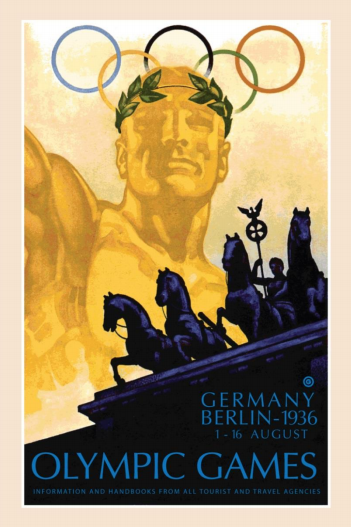Berlin 1936 Olympic Games

Berlin 1936 Olympic Games
Berlin 1936 Olympic Games, athletic festival held in Berlin that took place August 1–16, 1936. The Berlin Games were the 10th occurrence of the modern Olympic Games.
The 1936 Olympics were celebrated in a tense, politically charged atmosphere. The Nazi Party had risen to power in 1933, two years after Berlin was awarded the Games, and its racist policies led to international debate about a boycott of the Games. Fearing a mass boycott, the International Olympic Committee pressured the German government and received assurances that qualified Jewish athletes would be part of the German team and that the Games would not be used to promote Nazi ideology.
Adolf Hitler’s government, however, didn’t keep its promises: pamphlets and speeches about the natural superiority of the Aryan race were given to the people; and the Reich Sports Field, which included four stadiums, was covered in Nazi flags and symbols. But the attraction of a good sports competition was too great, and in the end, 49 countries went to the Olympic Games in Berlin.
The Berlin Olympics also had technological advancements. It was the first Olympic competition to use telex transmissions of results, and zeppelins were used to quickly transport video to other European cities. The Games were televised for the first time.

Nearly 4,000 athletes competed in 129 events. The track-and-field competition starred American Jesse Owens, who won three individual gold medals and a fourth as a member of the triumphant U.S. 4 × 100-metre relay team. Owens and his teammates also won 12 men’s track-and-field gold medals; the success of Owens and the other African American athletes, referred to as “black auxiliaries” by the Nazi press, was considered a particular blow to Hitler’s Aryan ideals.

However, the Germans did win the most medals overall, dominating the gymnastics, rowing, and horse events. Hendrika (“Rie”) Mastenbroek of the Netherlands won three gold medals and a silver medal in the swimming competition. Basketball, an Olympic event for the first time in 1936, was won by the U.S. team. Canoeing also debuted as an Olympic sport.
The 1940 and 1944 Games, scheduled for Helsinki, Finland (originally slated for Tokyo), and London, respectively, were canceled because of World War II.